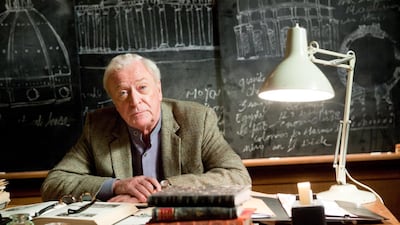Michael Caine attempted to clear up the mystery surrounding one of the most ambiguous movie endings in recent history during a recent Q&A at a Film4 Summer Screen showing of Christopher Nolan's Inception in London.
The movie has had film fans arguing over its closing scenes for close to a decade – in the scenes (spoiler alert), Leonardo DiCaprio's dream-invading extractor Dom Cobb finally returns to his US home, where he is met by his father-in-law, played by Caine, and returns to his family home to be reunited with his children after years of exile, falsely accused of his wife's murder. While this happens, Cobb's "totem", a spinning top he uses to distinguish the dream world from reality, continues to spin on the table, suggesting Cobb is still in a dream and chooses to ignore that fact so he can be reunited with his family, even if only in a reverie.
Caine seems to have put an end to this theory, however. The veteran British actor told the audience in London: "When I got the script of Inception, I was a bit puzzled by it. I said [to Nolan]: 'I don't understand where the dream is.' I said: 'When is it the dream and when is it reality?' He said: 'Well, when you're in the scene, it's reality.' So get that – if I'm in it, it's reality. If I'm not in it, it's a dream."
Caine’s character is very much in the closing scenes, so seemingly that’s case closed? Conclusively, it’s not a dream.
It's not even the first time that Caine has posited his interpretation. He told entertainment website Screen Rant in 2010: "If I'm there it's real, because I'm never in the dream. I'm the guy who invented the dream."
Except it's not that simple, is it? First of all, why haven't Cobb's children aged significantly in the time he's been in exile? We're never given an exact length of time, but we're led to believe it's significant. On the other hand, despite still looking very young at the end, the children are played by different actors in the final scene to elsewhere in the film – something has clearly changed. So that point seems to end in a 1-1 draw.
Some fans have also noted that the top shows a slight wobble just before the cut, indicating it’s a about to drop, and thus that it is not a dream. However, the top doesn’t stop spinning before the cut, so surely it is a dream?
The script itself seems to contradict Caine’s theory, meanwhile. Its final line is: “Behind him, on the table, the spinning top is STILL SPINNING. And we – FADE OUT.” So it definitely is a dream, then, right?
Nolan himself is clearly a fan of the ending's ambiguity. He told Entertainment Weekly, also in 2010: "I put that cut there at the end, imposing an ambiguity from outside the film. That always felt the right ending to me – it always felt like the appropriate 'kick' to me … The real point of the scene – and this is what I tell people – is that Cobb isn't looking at the top. He's looking at his kids. He's left it behind. That's the emotional significance of the thing."
Observant pedants would also have noted that the spinning top isn't actually Cobb's totem – it's his late wife's totem. Cobb's totem is his wedding ring – he only wears it when he's in a dream, and never has it on in the real world. When he hands in his passport at immigration at the end of the film, he is clearly not wearing a wedding ring, so it's not a dream.
But wait – why is the entire final sequence shot in soft-focus slow-motion, with a sea of blank faces surrounding Cobb at Los Angeles airport? If you searched for "how to shoot a dream sequence" in Film Directing for Dummies, this is how you would shoot it – so it is a dream, then.
Caine's latest intervention seems to reopen the long-simmering debate, rather than settle it once and for all. If one thing appears certain, it's that we won't be getting any more clues from the film's writer-director.
Nolan said in the same Entertainment Weekly interview in 2010: "I've been asked the question more times than I've ever been asked any other question about any other film I've made … What's funny to me is that people really do expect me to answer it."
__________________ Read more:
'Crazy Rich Asians' hoopla elicits mixed feelings in Asia
Blade at 20: how the film kick-started Marvel's cinematic success
__________________

